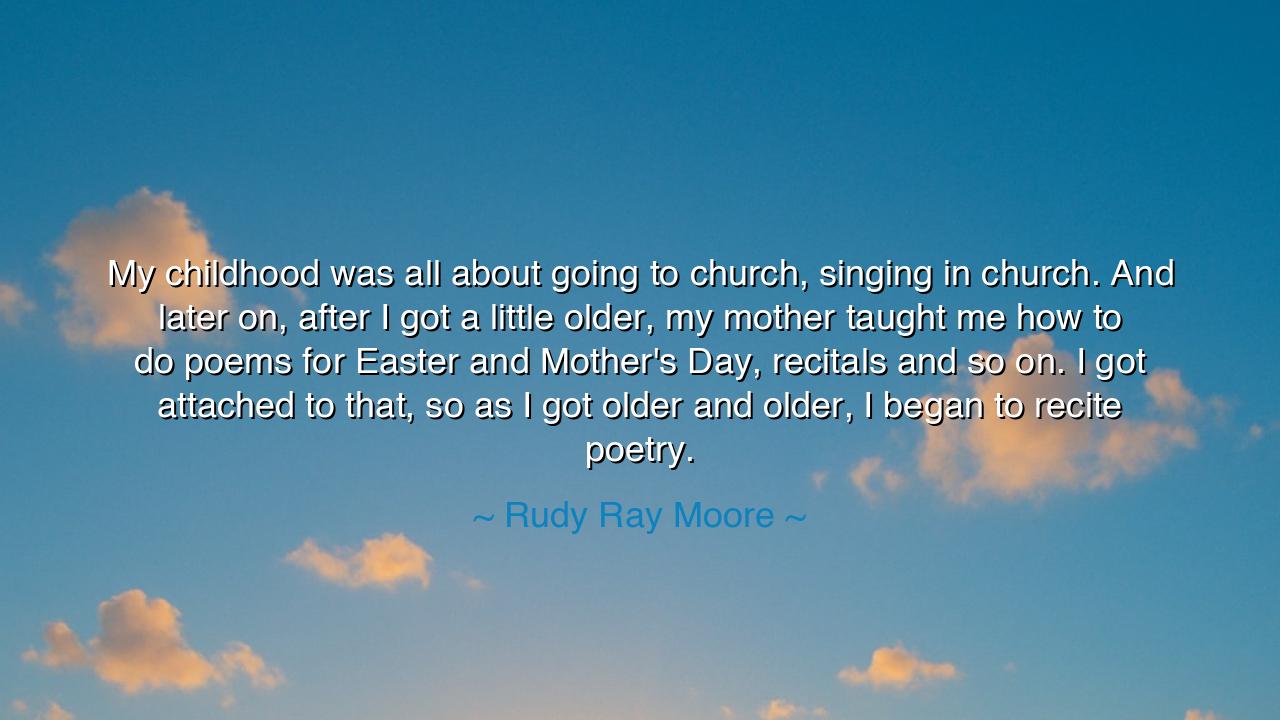
My childhood was all about going to church, singing in church.
My childhood was all about going to church, singing in church. And later on, after I got a little older, my mother taught me how to do poems for Easter and Mother's Day, recitals and so on. I got attached to that, so as I got older and older, I began to recite poetry.






In the soulful and heartfelt words of Rudy Ray Moore, we hear the echo of a journey shaped by faith, art, and the enduring power of the spoken word: “My childhood was all about going to church, singing in church. And later on, after I got a little older, my mother taught me how to do poems for Easter and Mother’s Day, recitals and so on. I got attached to that, so as I got older and older, I began to recite poetry.” These words, though spoken simply, contain within them the story of how a seed planted in the soil of tradition can grow into the tree of creativity and self-expression. In them lies a lesson on the sacred origins of art — that true inspiration is born not in luxury or fame, but in the humble rhythms of faith, family, and community.
The origin of this quote lies in Moore’s recollection of his early years, long before the world would know him as a pioneer of comedy, rhythm, and performance. Raised in the South during an age when church was not only a place of worship but the beating heart of community life, he found his voice among the hymns and recitations of those gatherings. The church was his first stage, the congregation his first audience, and his mother his first teacher. By guiding him to perform poems for sacred days — Easter, the symbol of renewal, and Mother’s Day, the celebration of love — she gave him both discipline and devotion. From these beginnings, he discovered that words, when spoken from the heart, have the power to move souls.
Moore’s story reflects a truth known since ancient times: that art and spirit are born from the same breath. In every culture, from the oracles of Delphi to the griots of Africa, from the psalmists of Israel to the poets of Persia, it is through performance — through voice and story — that people have sought to connect with the divine and with one another. The young Moore, standing before his congregation, was part of this eternal lineage. His recitations were not mere acts of entertainment; they were acts of offering, where rhythm met reverence, and where the human voice became an instrument of creation.
There is a sacred beauty in the way Moore’s mother nurtured his gift. Like the mothers of old — those who passed on songs and scriptures to their children — she understood that to teach a child to speak is to teach him to think, and to feel, and to dream. In giving him poetry, she gave him a mirror for the soul, a way to transform emotion into expression. Her lessons at home were the foundation for the artist he would one day become, just as Michelangelo’s chiseling began in his father’s workshop, or as Beethoven’s greatness began with the discipline imposed by his own family’s guidance. Behind every creator stands a figure like Moore’s mother — a quiet guardian of inspiration.
As Moore grew, he did not abandon those roots; rather, he expanded upon them. What began as poetry recited in church evolved into performance on stages, records, and screens. Yet the essence remained the same: the rhythm, the passion, the soul of his words still carried the echoes of those early recitals. In his performances, one could still hear the cadence of the preacher, the spirit of the psalm, and the reverence of a boy raised in the shadow of Easter’s promise — that from every ending, there can arise a new beginning. Thus, Moore’s quote is not merely a memory; it is a testimony to the continuity of art and faith through the evolution of life.
This truth extends far beyond Moore’s story. For every human being possesses within them a creative spark — a voice shaped by their earliest surroundings, their mentors, and their traditions. Whether in music, in craft, or in speech, what we create carries the imprint of our beginnings. Moore teaches us that no origin is too humble, no lesson too small. Even the act of standing before a congregation as a child and reciting a verse can shape the destiny of a life. The church, the family, the community — these are the sacred forges in which the human spirit is tempered and refined.
So let this be the lesson: cherish the origins of your gifts. Remember the hands that guided you, the voices that first taught you to speak. Return often to the places that grounded your soul — your childhood home, your community, your roots — for it is there that the fire of creativity first began to glow. And if you are a parent, a teacher, a mentor, know the power of your guidance: a single word of encouragement, a single poem taught, can become the cornerstone of another’s destiny.
For as Rudy Ray Moore reminds us, greatness does not begin in fame, but in the tender shaping of youth — in the hymns sung beneath church rafters, in the verses spoken before family, in the sacred act of sharing words aloud. From such moments arise the poets, prophets, and creators of every age. And those who honor their beginnings, who never forget the soil that nurtured their roots, will find that their art — like the promise of Easter itself — is renewed again and again, forever alive, forever reborn.






AAdministratorAdministrator
Welcome, honored guests. Please leave a comment, we will respond soon